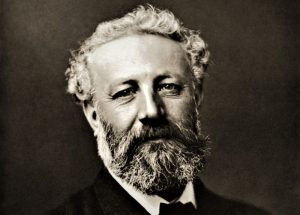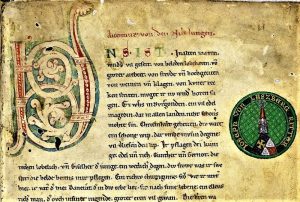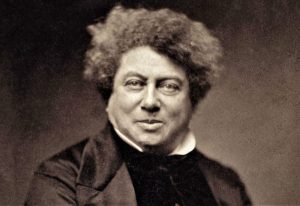Jules Verne
In universal literature history, Jules Verne is a French writer known as the father of science fiction stories. His stories are full of impressive adventures, novel inventions for his time and fantastic characters that have touched young and grown-up people. After Agatha Christie, Jules Verne is the European author with the most translated works, especially those that are part of the series "Extraordinary Journeys" such as "Journey to the Centre of the Earth" (1864), "Twenty thousand leagues of underwater travel" (1870), "Around the World in Eighty Days" (1873), among others.

Personal Information
- Born: 08/02/1828
- Time of death: 24/03/1905
- Nationality: French
Who was Jules Verne?
Jules Gabriel Verne was a French writer, poet and playwright known for his sci-fi adventure stories. He is recognized as one of the most important French writers in Europe. And he is considered the father of science fiction stories. His best-known adventure novels are grouped together in the series "Extraordinary Journeys", a work composed of sixty stories that are loaded with adventures and science fiction that made a great impact in his time and nowadays.
Biography
Jules Verne was born in Nantes on 8 February 1828 in the île de Feydeau district. His father was Pierre Verne and his mother Sophie Allotte de la Fuÿe. Julius was the eldest of five brothers, Paul, Anna, Mathilde and Marie.
The writer began his studies in 1839 at Saint-Stanislas College where he showed his skills in Geography, Latin, Greek and singing. He also showed great interest in science and poetry.
In 1847, he began his law studies in Paris and wrote a play entitled Alexander VI. Thanks to his uncle Châteaubourg’s support, Jules Verne was introduced to the circles of writers where he met Alexandro Dumas (father and son). In 1849, he received the title of lawyer, but his interest remains dramatic writing.
His father was annoyed because Jules had not devoted himself to his legal career and stopped financing his stay in Paris, a fact that brought serious health consequences to the young writer ranging from stomach and nervous disorders to facial paralysis.
At the age of 22, Jules Verne wrote and published several comedies, some stories, libretti for operettas and some short novels thanks to Alexander Dumas’ support. He also works as a secretary at the National Theatre in Paris, where he earns enough to live in the French capital.
In 1856, she married Honorine Deviane Morel, widow and mother of two daughters, Valentine and Suzanne. Jules Verne and his wife had a son named Michel Verne in 1870.
In 1859 he travelled to Scotland and wrote his first novel. Paris in the twentieth century, but this is one of the few he could not publish in life because of his pessimistic approach.
Years later, in 1863, Jules publishes the first of his sixty stories from Extraordinary Journeys, entitled Five Weeks in a Balloon. The Extraordinary Journeys series lasted almost 40 years. Among the best-known stories in this series are: A Journey to the Center of the Earth (1864), From Earth to the Moon (1865), The Sons of Captain Grant (1867). Twenty thousand leagues of underwater travel (1869), The Mysterious Island (1874), Around the World in 80 Days (1873), Miguel Strogoff (1876) and The Superb Orinoco (1898).
In 1888, Jules Verne participated in the political camp of Amiens, where he was elected councilor of the City Council where he developed projects to improve the city.
Jules Verne died on 24 March 1905 at the age of 77, suffering from diabetes, in his house in Amiens. His remains rest in the cemetery of La Madeleine, north of Amiens.
Jules Verne’s style
Jules Verne’s novels are part of science fiction genre. His stories are full of adventures, fantastic inventions and very particular characters who have progressive and human visions.
It is important to mention that Jules Verne considered himself a writer of scientific literature rather than fiction, and his stories anticipated many inventions that only existed after his death such as the submarine, helicopter, the elevator, spaceships, etc.
Acknowledgements
Jules Verne was decorated Knight of the Legion of Honor for his contributions to education and science in 1892.
In 1999, Jules Verne was included in the Science Fiction Hall of Fame.
Outstanding works
His most outstanding works include comedies, dramas and novels.
In relation to comedies and dramas we can mention: Alejandro VI (1847), The Conspiration (1847), Abdallah (1849), A drama under Luix XIV (1849), One Thousand and Two Nights (1850), Broken Straws (1850), The Wise Men (1851), Eleven Days of Siege (1861), among others.
In opera and operettas he published: Colin Maillard (1853), Les companions of Marjolaine (1855), The Hostel of the Ardennes (1860), Lord chimpanzee (1860), among others.
On the other hand, in novels, the best known belong to the Extraordinary Journeys series. Of these we can mention: Journey to the Center of the Earth (1864), From the Earth to the Moon (1865), The Sons of Captain Grant (1867). Twenty thousand leagues of underwater travel (1869), The Mysterious Island (1874), Around the World in 80 Days (1873), Miguel Strogoff (1876) and The Superb Orinoco (1898) among others.
Jules Verne phrases
Jules Verne left in his writings many phrases that became famous with time. Some of them are:
- “There are no impossible obstacles; there are only strong and weak wills.”
- “Paying attention to the madmen makes great discoveries.”
- “Everything that has been done so great has been in the name of exaggerated hopes.”
- “As long as there is life, there is hope.”
- “The earth does not need new continents, but new men.”
- “The future does not worry me; what is hard sometimes is the present.”
- “As long as the heart beats, as long as the flesh beats, I do not explain to myself that a being endowed with will allows himself to be dominated by despair.”
- “Loneliness, isolation, are painful things and are beyond human resistance.”
- “An energetic man will succeed where an indolent will vegetate and die.”
- “Necessity is the teacher who teaches best and from whom lessons are best learned.”
- “Reality provides us with facts so romantic that imagination could add nothing to it.”
- “It seems wiser to assume the worst from the beginning and let the best come as a surprise.”
- “Everything that I invent, everything that I imagine, will always be more here than the truth, because there will come a time when the creations of science will surpass those of the imagination.
- “The opportunity that now may seem lost may present itself at the last moment.”
- “There is nothing like imagining creating a future, because what is utopia today will be flesh and blood tomorrow.
- “Whatever one man can imagine, other men can make it real.”
How to cite this article?
Briceño V., Gabriela. (2019). Jules Verne. Recovered on 24 February, 2024, de Euston96: https://www.euston96.com/en/jules-verne/









